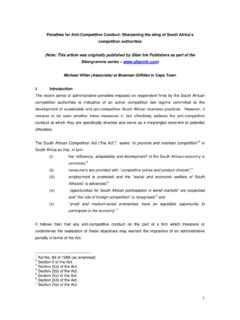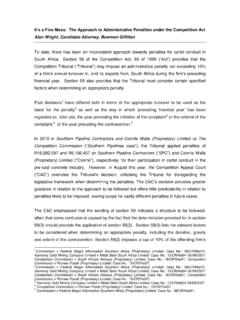Transcription of Kabanga v South African Airways - Refugee Rights Unit
1 Kabanga AND ANOTHER v South African Airways t/a INTERLINE AND OTHERS 2003 (1) SA 217 (W) 2003 (1) SA p217 Citation 2003 (1) SA 217 (W) Case No 136/2002 Court Witwatersrand Local Division Judge Makhanya J Heard January 10, 2002 Judgment January 14, 2002 Counsel H H Cowley for the applicants. No appearance for the first respondent. G Hulley for the second and third respondents. Annotations Link to Case Annotations B [zFNz]Flynote : Sleutelwoorde Immigration - Prohibited person - Persons attempting to enter Republic without valid passport and visa - Provisions of s 11(1), read with s 11(3) - (5), of Aliens Control Act 96 of 1991 applicable to such persons - Provisions of ss 6(1), 7(1), 9(1) and 52(1) of Act not applicable to such persons.
2 C [zHNz]Headnote : Kopnota The provisions of s 11(1), read with s 11(3), (4) and (5), of the Aliens Control Act 96 of 1991 apply to persons who attempt to enter the Republic of South Africa and who fail to produce to an immigration officer a valid passport and a valid visa. The provisions of ss 6(1), 7(1), 9(1) and 52(1) of the Act do not apply in such circumstances. (At D 219J - 220A/B and 220J - 221A/B.) [zCAz]Cases Considered Annotations Reported cases Johnson v Minister of Home Affairs and Another 1997 (2) SA 432 (C): dictum at 434H - I approved and applied E Okekwukwu-Nnoluga v Ghana Airlines and Others 2000 (4) SA 676 (W): not approved and not followed. [zSTz]Statutes Considered Statutes The Aliens Control Act 96 of 1991, ss 6(1), 7(1), 9(1), 11(1), (3), (4), (5), 52(1): see Juta's Statutes of South Africa 2001 vol 5 at 2-11, 2-12, 2-23 - 2-24.
3 F [zCIz]Case Information Return of a rule nisi in an application for an interdict and ancillary relief. The facts appear from the reasons for judgment. H H Cowley for the applicants. No appearance for the first respondent. G G Hulley for the second and third respondents. Cur adv vult. Postea (January 14). [zJDz]Judgment Makhanya J: This is a return day in an urgent application in which the first and second applicants seek the H following orders: '1. That the respondent be prohibited from taking any action to secure the second applicant's deportation or removal from South Africa, pending the final determination of this application. 2. That the second respondent is ordered to furnish his record and reasons for his decision, dated 8 January 2000, I refusing the second applicant entry into the Republic of South Africa, within ten days after the granting of this order and directing him to show cause why the said decision should not be reviewed; J 2003 (1) SA p218 MAKHANYA J That the applicants be allowed to supplement their papers A should the second respondent decide to furnish a record and reasons for his decision; and That the Court determines a date suitable for the hearing of the review of the second respondent's decision.
4 3. Alternatively to prayer 2 above, that the second and third respondents are ordered to comply with the provisions of s 52 of B the Aliens Control Act 96 of 1991 (hereinafter referred to as ''the Act''). 4. That the respondent be ordered to apply its mind to the issuing of a permit in terms of s 41 of the Act, allowing the second applicant to enter the Republic of South Africa pending the final C determination of this application. 5. The respondents be ordered to pay the costs of this application.' The application is brought against the South African Airways trading as Interline, as the first respondent, the Immigration Officer, D Johannesburg International Airport, as the second respondent, and the Minister of Home Affairs, as the third respondent.
5 On Thursday, 10 January 2002 the Court, after hearing the application postponed the matter for judgment on Monday, 14 January 2002, and granted the first order sought herein. Hence this is a return day of the rule nisi. E It is common cause between the parties that the first and second applicants emanate from the Democratic Republic of Congo; that they are either married or are involved in a relationship; and that the first applicant is a Refugee in the Republic and was granted such status on 11 July 2000. F It appears that on 5 January 2002 the second applicant was aboard the aircraft of the first respondent. He arrived at the Johannesburg International Airport where the representative of the second respondent demanded, pursuant to the provisions of s 11(1) of the Act, from him the production of a valid passport and/or valid visa.
6 The second applicant produced two exemption permits or G certificates purporting to have been issued in terms of s 28(2) of the Act. These certificates exempted him unconditionally and for an unspecified period from the provisions of s 23(a) of the Act from the date of their issue and thereby granted him permanent residence in the Republic. The certificates are identical but were issued on 11 November 1996 and 17 July 1998 respectively. H It further appears that when the second applicant presented these certificates to the representative of the second respondent, the representative became suspicious as to the validity of the certificates because the reference number cited or reflected thereon did not correspond or accord with reference numbers issued to these types of exemptions.
7 The representatives accordingly conducted an investigation I which ended with the finding that the certificates or exemptions presented by the second applicant were not issued by the Department of Home Affairs because no records upon which the certificates were granted were found, nor were the certificates' reference numbers existent. In the circumstances, the representative of the second respondent concluded that the J 2003 (1) SA p219 MAKHANYA J second applicant has failed to produce as required a valid passport and/ or valid visa and refused him A entry into the Republic as a prohibited person. He was immediately furnished with the notice of refusal which also informed him that, in terms of the Act, the first respondent as his conveyor to the Republic is bound to remove him from the Republic.
8 The notice of refusal of entry was issued to the second applicant pursuant B to the provisions of s 11(1) of the Act. From the answering affidavit filed on behalf of the second and third respondents, it appears that the second applicant previously first entered the Republic on 27 November 1991 on a temporary permit valid until 3 January 1992. He was then on holiday. Thereafter, he applied for a study permit which was granted. This permit expired on C 30 September 1996. The said affidavit also states that the second applicant has at various times since his first arrival here applied and has at various times been refused permanent residence and work permits. These applications with their concomitant refusals, it is stated, started in 1994 and culminated on 31 March 1999.
9 The second and D third respondents state in particular that the second applicant applied for a permanent residence permit on 15 December 1997, which application was turned down and that this, significantly, happened after the purported date of the granting of a permanent residence certificate which the second applicant produced on demand to E the representative of the second and third respondents on 5 January 2002. The statements of the second and third respondents recounted above regarding the second applicant's history or record about the applications and their dismissals has not been disputed by the first and second applicants. F Indeed, through their counsel, they stated that they do not intend replying to the second and third respondents' answer.
10 Their counsel submitted, however, that the refusal of entry to the second applicant on 5 January 2002 constituted an irregularity because it was founded on the basis of s 11(1) of the Act which section applies G only to refusal of entry to persons who have already entered the Republic. Accordingly, so the submission goes, the second applicant as a person who was entering the Republic should have been refused entry in terms of s 6(1) of the Act read together with ss 7(1) and 9(1) of the Act. This procedure would, so goes the argument on behalf of the applicants, culminate in the application of the provisions of s 52(1), H which is a review procedure, and, because this suggested peremptory procedure in the circumstances of the second applicant was not followed, this Court should grant an order in terms of the prayers sought; in essence enforcing the suggested procedure on the second and third respondents.









